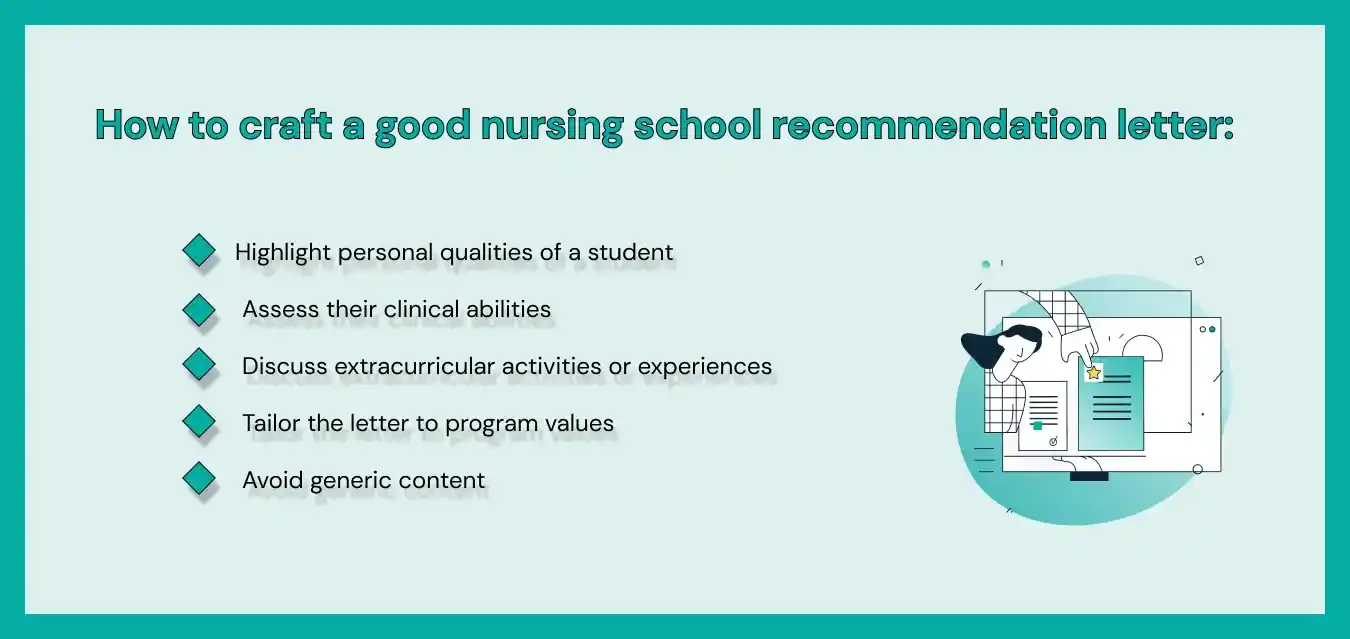In the highly competitive realm of nursing school admissions, the power of a well-constructed letter of recommendation for nursing student cannot be overstated. Today, I will delve into the intricate art of composing compelling recommendation letters. This article will be an indispensable guide for both recommenders and aspiring nursing students. With 16 years of practical nursing experience, I will identify key elements that make a recommendation letter stand out. So, if you want to acknowledge the art of writing a letter of recommendation, stay with us. In the competitive world of nursing admissions, a written letter of recommendation is the key to unlocking a student’s potential.
For students aiming to craft compelling nursing essays, our nursing essay services offer expert guidance tailored to your needs.
This article explores the intricacies of a recommendation letter for nursing student, offering insights and examples to guide both recommenders and aspiring nursing students toward success.
Navigating the Admission Maze: Why You Need a Good Recommendation Letter for Nursing
A compelling recommendation letter is not just a formality; it’s a powerful tool that can shape a nursing student’s future trajectory. The need for a good recommendation letter for nursing becomes particularly pronounced when considering the intense competition for coveted spots in nursing programs. These letters are testimonials of a student’s capabilities beyond what grades and standardized test scores can convey. A well-crafted recommendation letter can be the deciding factor that sets an applicant apart.
Here are some key reasons highlighting the importance of a good recommendation letter in the nursing school application process:
- Holistic assessment. Recommendation letters provide a holistic view of a student, offering insights into their character, work ethic, and suitability for nursing.
- Personal attributes. They reveal essential traits like compassion, resilience, and interpersonal skills, which are not always evident in academic records.
- Clinical aptitude. A good letter can showcase a student’s clinical performance and ability to apply theoretical knowledge in real-world scenarios.
- Work ethic and dedication. A recommendation letter can vouch for a student’s work ethic and commitment to their studies and clinical responsibilities.
- Unique contributions. It highlights unique contributions and experiences, enriching the diversity of the nursing cohort.
Guidelines and Tips on How to Write a Nursing School Recommendation Letter
Crafting a nursing school recommendation letter is both an art and a responsibility. It involves more than just listing achievements; it requires a deep understanding of the student’s character, clinical abilities, and potential contributions to the nursing profession. A great recommendation letter vouches for students’ academic prowess and provides a glimpse into their passion for nursing and their ability to thrive in a demanding educational environment.
Key considerations for crafting a compelling nursing school recommendation letter:
- Understanding the student’s character. Delve into the personal attributes that make the student stand out. Highlight qualities such as empathy, integrity, and a strong work ethic.
- Assessment of clinical abilities. Provide specific examples of the student’s performance in clinical settings. Discuss their ability to apply theoretical knowledge to real-world patient care.
- Potential contributions to the nursing profession. Articulate how the student’s unique qualities align with the nursing profession’s values. Discuss any extracurricular activities or experiences that demonstrate their commitment.
- Tailoring the letter to program values. Recommenders take the time to familiarize themselves with the specific nursing program’s values and requirements. This ensures the recommendation letter is tailored to meet the admissions committee’s expectations.
- Avoiding generic content. A generic letter may not effectively convey the unique qualities that make a student an ideal fit for a particular nursing school.
Sample Letter of Recommendation for Nursing Students
Each carefully chosen word in the sample recommendation letter for nursing student encapsulates the essence of academic prowess, clinical excellence, and the unique qualities that set one on the path to success.
| To whom it may concern,I am pleased to wholeheartedly recommend [Student’s Name] for admission to your esteemed nursing program. As [his/her] [instructor/colleague], I have had the privilege of witnessing [his/her] exceptional dedication to both academic excellence and compassionate patient care. [Student’s Name] possesses a rare blend of clinical proficiency, interpersonal skills, and a genuine passion for clinic nursing. I am confident that [he/she] will contribute significantly to your program and excel in all endeavors.Sincerely, [Your Name] |
If you’re seeking assistance with your assignments, our homework help services are designed to support you throughout your academic journey.
Letter of Recommendation for Nursing Students from the Instructor
Seeking a letter of recommendation for nursing student from instructor is crucial in the application process. In this scenario, students should approach instructors who have had firsthand experience with their clinical skills. This ensures that the resulting letter is an overall endorsement and a detailed and authentic assessment of the student’s capabilities.
The instructor is in a unique position to speak to the student’s performance in both academic and clinical settings. A recommendation letter from an instructor should go beyond summarizing grades; it should provide insights into the student’s dedication, work ethic, and interpersonal skills.
An effective letter of recommendation from an instructor should leave the admissions committee with a clear understanding of the student’s potential and suitability for the nursing program.
Cases When a Letter of Recommendation Is Needed
Understanding when a letter of recommendation is needed is essential for nursing students navigating the admissions process. There are several scenarios where these letters play a pivotal role:
a) Nursing school admissions. A well-crafted recommendation letter for nursing student admission can make all the difference when vying for a competitive nursing program.
b) Scholarship applications. Students seeking financial assistance through scholarships often need recommendation letters to strengthen their application and showcase their suitability for the scholarship.
c) Clinical rotations and internships. Many nursing programs require students to complete clinical rotations or internships. A recommendation letter can be instrumental in securing desirable placements by emphasizing the student’s clinical skills, professionalism, and dedication.
Whom to Ask and What to Include in the Letter
Choosing the right person to give a recommendation is really important. Ideally, this should be an individual who can speak to the student’s academic prowess, clinical skills, and character.
Here are some examples of individuals who could make excellent recommenders for a nursing student:
- Clinical instructors or preceptors. Clinical supervisors offer insights into the student’s practical skills, work ethic, and application of theoretical knowledge in real-world settings.
- Nursing professors. Nursing faculty can vouch for the student’s academic excellence, commitment to learning, and grasp of nursing concepts.
- Supervisors in healthcare settings. Healthcare supervisors offer valuable insights into the student’s professionalism, teamwork, and adaptability in real-world settings.
Providing recommenders with specific guidance, including the purpose of the recommendation and traits to highlight, ensures that the letter aligns with the student’s goals.
| HANDPICKED RELATED CONTENT:Nursing School Essay Examples |
Examples of Letters
So, “How to write a letter of recommendation for a nursing student?” you can ask. The best way to learn is through examples. And we are free to help you understand this aspect and write your own letter.
Here is a recommendation letter sample for nursing student:
| To whom it may concern,I am writing to highly recommend [Student’s Name] for admission to your esteemed nursing program. I had the pleasure of instructing [him/her] during [course name] at [University]. [Student’s Name] consistently demonstrated exceptional academic abilities, maintaining a GPA of [X].What sets [him/her] apart is [his/her] hands-on approach to learning. During clinical rotations at [Hospital], [Student’s Name] exhibited a strong grasp of nursing procedures and a compassionate bedside manner. [He/She] proactively sought learning opportunities and actively contributed to the healthcare staff. I am confident that [Student’s Name] will excel in your program and contribute valuable nursing contributions. [He/She] possesses the dedication, intellectual curiosity, and interpersonal skills necessary for success in this field. Sincerely, [Recommender’s Name] |
This example effectively combines academic achievements with some specific instances of clinical excellence. The recommender highlights the student’s proactive approach and contributions to the healthcare team, painting a comprehensive picture of their abilities.
Here is another letter of recommendation template for nursing student:
| Dear Admissions Committee,I am pleased to recommend [Student’s Name] for admission to your nursing program. As [his/her] clinical instructor at [Hospital], I had the privilege of witnessing [his/her] growth and dedication to the nursing profession.During [his/her] time in the clinical setting, [Student’s Name] demonstrated an understanding of medical procedures and an ability to handle challenging situations well on multiple occasions. [He/She] showed excellent communication skills, effectively collaborating with patients and healthcare professionals. In addition to [his/her] clinical acumen, [Student’s Name] exhibited a strong commitment to continuous learning. [He/She] actively sought feedback, implemented suggestions, and consistently exceeded the clinical rotation requirements. I do not doubt that [Student’s Name] will be a valuable asset to your nursing program and will make meaningful contributions to the healthcare field. Best Regards, [Instructor’s Name] |
The student’s commitment to continuous learning and effective communication skills is demonstrated in this example. The letter example vividly depicts the student’s dedication to personal and professional development, traits highly valued in nursing.
Mastering Personalization in Recommendation Letters
Mastering personalization in nursing school recommendation is an art that sets exceptional letters apart from the ordinary. A personalized letter goes beyond generic praises; it delves into specific aspects of the student’s character, achievements, and aspirations. For example:
- Specific achievements. Mentioning concrete accomplishments and successes of the student.
- Unique character traits. Highlighting distinctive qualities that set the student apart.
- Aspirations and goals. Exploring the student’s future plans and career aspirations.
- Personal growth. Discussing instances of significant personal development or overcoming challenges.
- Contributions to the community. Detailing the student’s impact on the community or involvement in extracurricular activities.
- Academic excellence. Noting outstanding academic achievements or improvements.
- Leadership skills. Recognizing instances where the student has demonstrated leadership qualities.
A personalized recommendation letter acknowledges the student’s individuality and connects their unique qualities to the requirements of the school nursing program. This level of personalization makes the letter more engaging and demonstrates a genuine investment in the student’s success.
Beyond the Classroom: The Impact of Extracurricular Activities in Recommendation Letters
The impact of extracurricular activities in recommendation letters extends far beyond the confines of academic achievements. Involvement in extracurricular activities showcases a student’s ability to balance academic commitments with other responsibilities, demonstrating qualities like time management, teamwork, and leadership.
In recommendation letters, extracurricular activities can be powerful examples of a student’s well-roundedness and potential to contribute to the nursing profession beyond the classroom.
Recommenders should know and highlight specific instances where a student’s participation in extracurricular activities has honed skills directly transferable to nursing.
Navigating Potential Weaknesses: Honest Recommendations for Growth
Addressing potential weaknesses in school recommendation letters requires a delicate balance of honesty and constructive feedback. Every student has areas where they can improve, and a recommendation letter that glosses over weaknesses may lack authenticity.
A very well-crafted recommendation letter should not shy away from addressing weaknesses but should frame them as opportunities for growth. A recommender can contribute to the student’s personal and professional development by providing constructive feedback.
The Role of Letters in Diverse Nursing Programs: Tailoring Recommendations for Specialized Fields
Tailoring recommendations for specialized fields in nursing programs involves a nuanced understanding of the unique qualities sought in those areas. Recommendation letters should not follow a one-size-fits-all approach, especially when applying to specialized nursing programs.
The Power of Mentorship: Writing Recommendations that Inspire Future Leaders
Writing a school recommendation letter that inspires future leaders involves recognizing and highlighting a student’s potential for mentorship and leadership roles in nursing. A recommendation letter can go beyond assessing current capabilities and provide insights into a student’s leadership potential.
In this comprehensive exploration of recommendation letters, I covered fundamentals and delved into nuanced aspects that can elevate these letters from standard to exceptional.
By embracing personalization, acknowledging weaknesses, and considering the evolving landscape of nursing education, both recommenders and aspiring nursing students can contribute to a more holistic and impactful application process.
The art of crafting a letter of recommendation for a nursing student is not multipurpose; it’s a dynamic and evolving process that shapes the future of nursing professionals.






